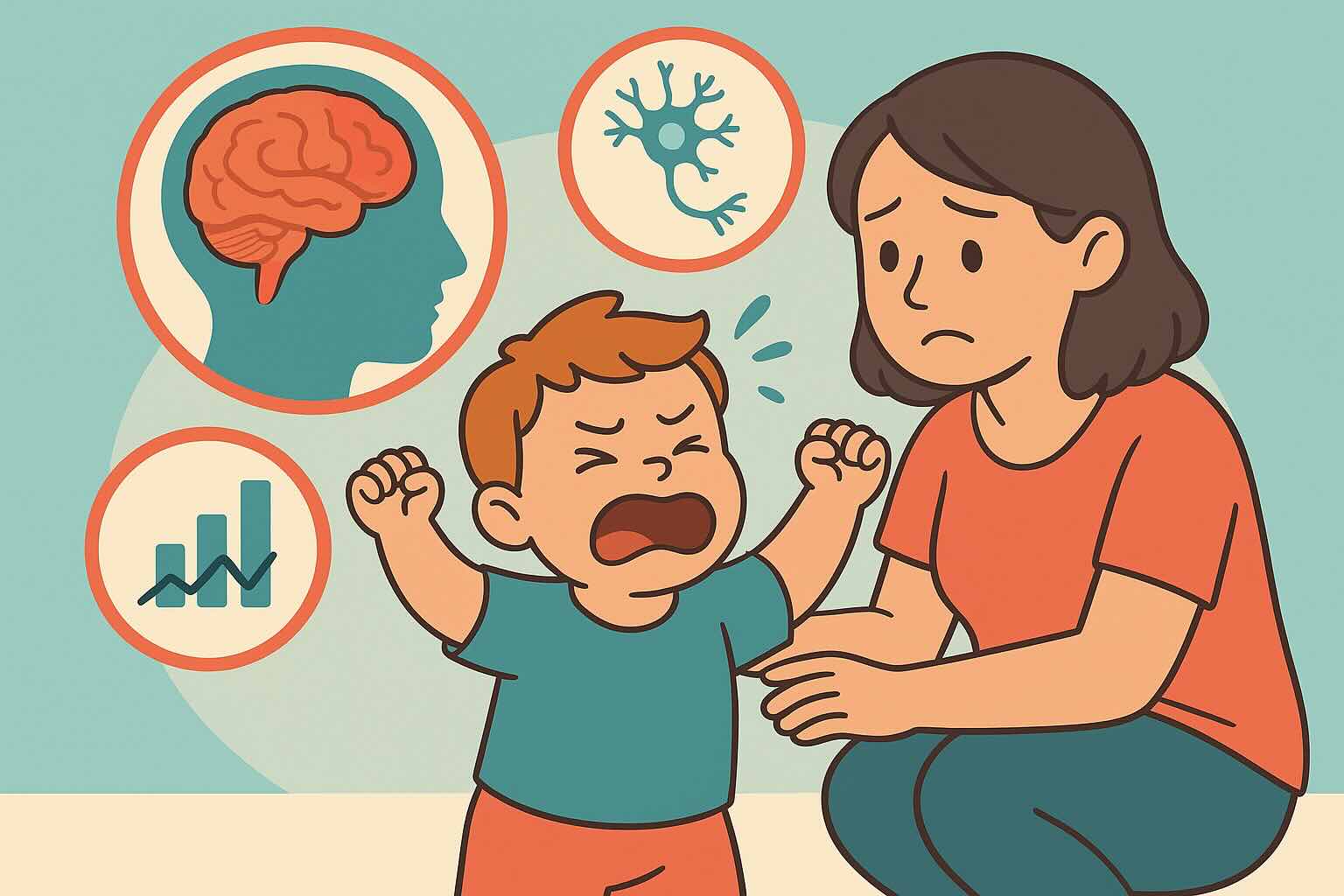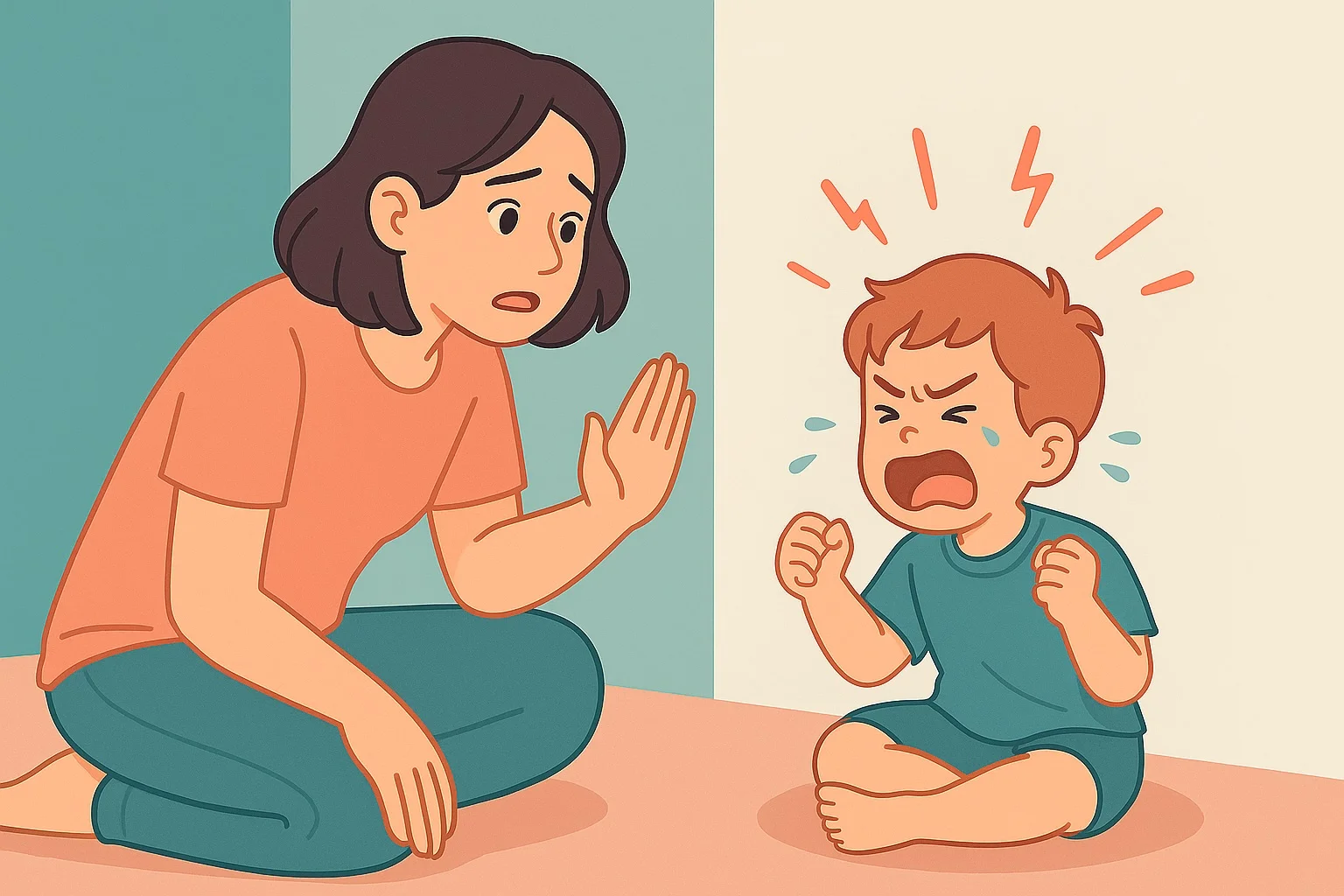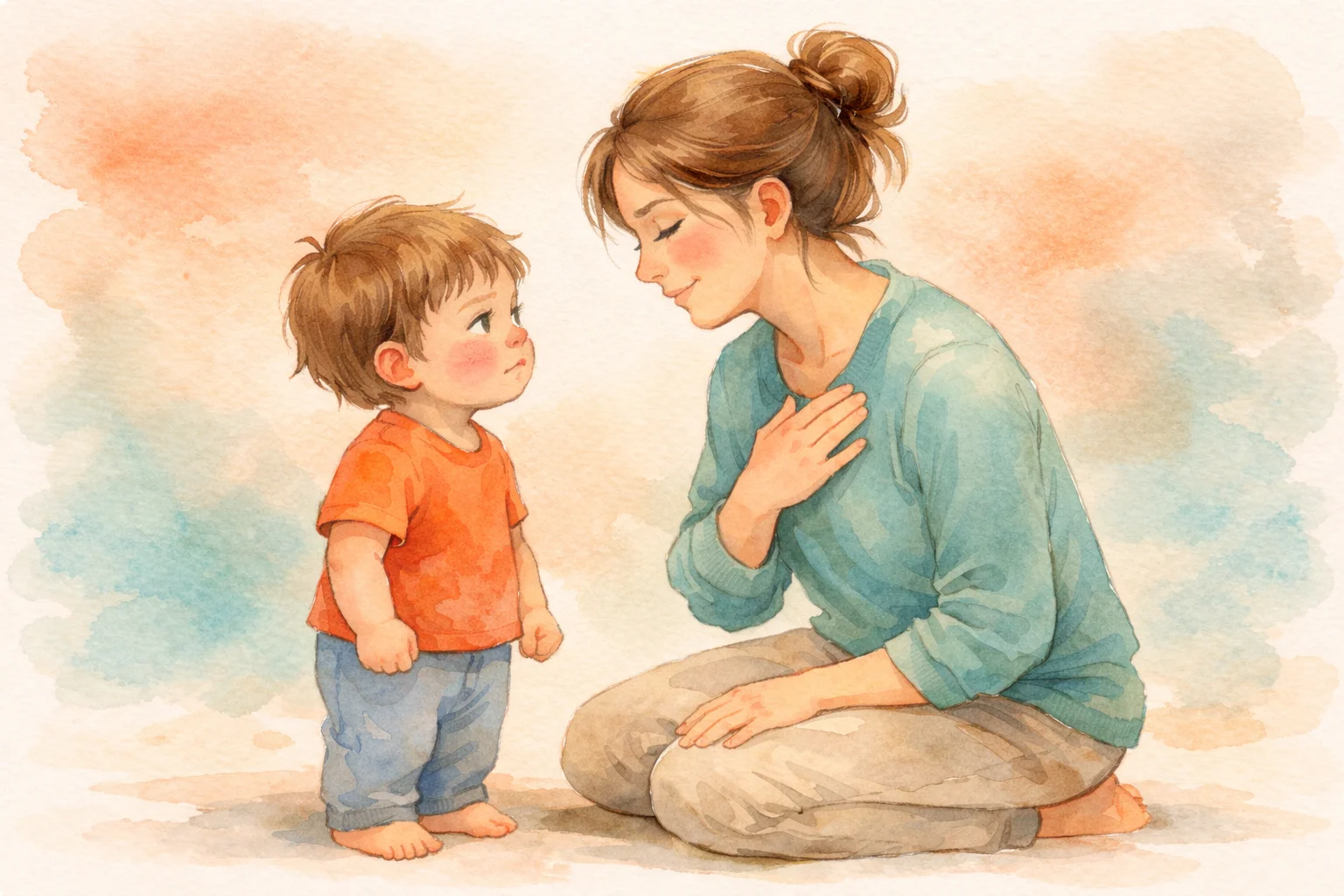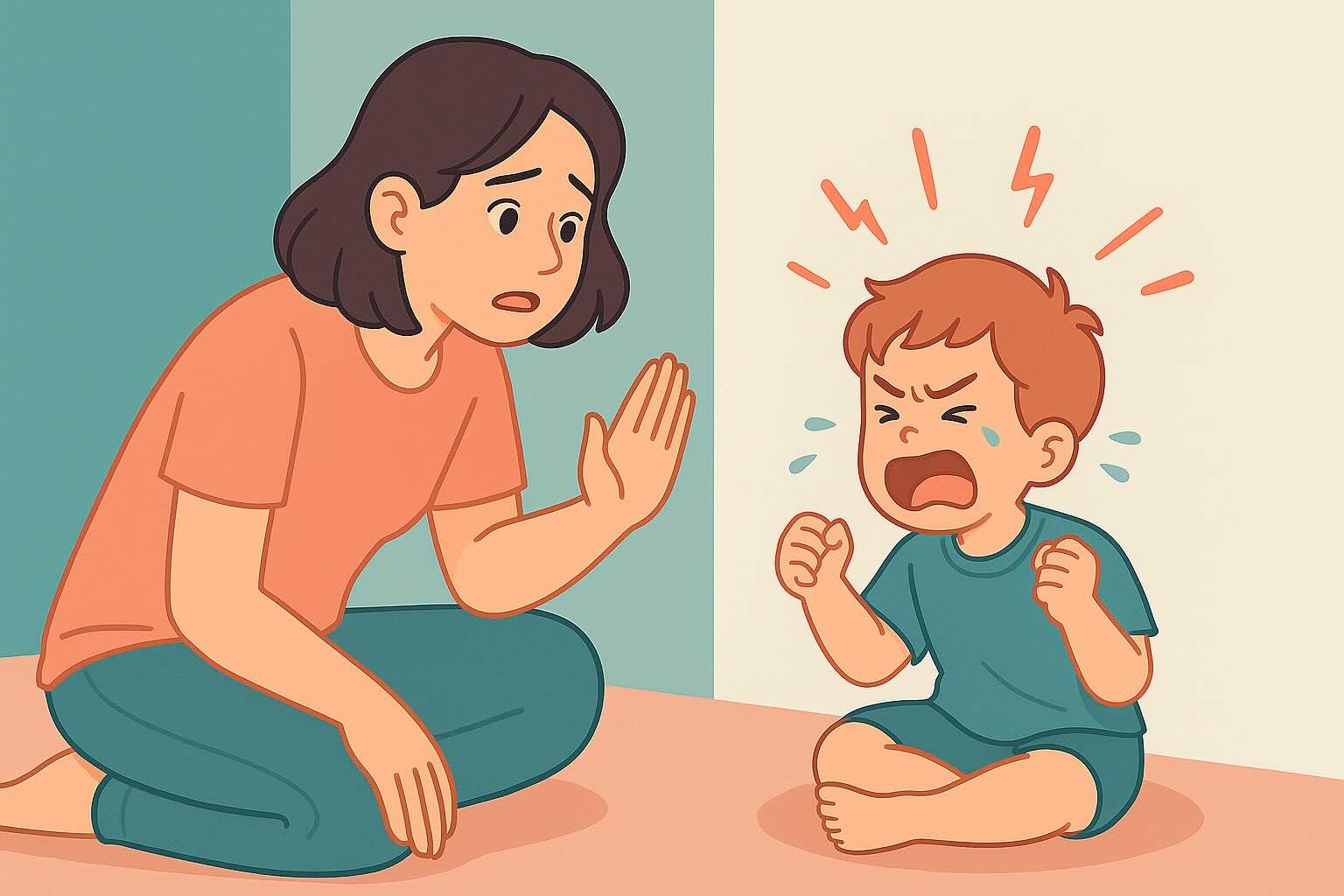5 Year Old Tantrums: 8 Expert Strategies for School-Age Meltdowns


Your 5-year-old stands on the edge of a major developmental milestone. Old enough to engage in sophisticated reasoning about emotions, yet still young enough to be completely overwhelmed by feelings of injustice, disappointment, or social confusion. If you're witnessing outbursts that seem both more mature and more intense than previous ages, you're observing the fascinating complexity of the 5-year-old emotional world.
At this age, your child isn't just experiencing bigger emotions—they're experiencing more nuanced emotions. The simple frustration of a 3-year-old has evolved into perfectionism, social anxiety, and complex feelings about fairness and justice. Understanding this emotional sophistication helps you respond in ways that honor their growing maturity while supporting their still-developing regulation skills.
The 5-Year-Old Developmental Sweet Spot
Your 5-year-old occupies a unique position in emotional development. Their thinking brain is significantly more developed than a preschooler's, allowing for abstract thinking, planning, and understanding of complex social dynamics. Yet their emotional regulation system is still years away from full maturity. This creates a child who can articulate sophisticated thoughts about feelings while still being overwhelmed by those same feelings.
Enhanced Cognitive Abilities
At 5, your child can understand cause-and-effect relationships, engage in hypothetical thinking, and consider multiple perspectives simultaneously. They can discuss what might happen if they make certain choices and understand that their actions affect others' feelings. This cognitive sophistication makes their outbursts feel more intentional and controllable than they actually are.
When your 5-year-old melts down because their drawing doesn't look "right," they're not being dramatic. They have a clear vision of their intended outcome, understand the gap between their vision and reality, and feel genuine distress about this discrepancy. Their cognitive abilities allow them to recognize their limitations, which can actually create more frustration than less awareness would.
Social and Emotional Complexity
The 5-year-old social world is rich with complex dynamics that can trigger intense emotional responses. Your child is becoming aware of social hierarchies, fairness concepts, and peer relationships. They notice when someone gets "more" or "better" and have strong opinions about what's fair. These social-emotional triggers are more sophisticated than the simple "mine" conflicts of earlier ages.
Understanding 5-Year-Old Emotional Triggers
The triggers that overwhelm your 5-year-old reflect their developmental stage and growing awareness of the world around them.
Perfectionism and Performance Anxiety
Many 5-year-olds develop perfectionistic tendencies as they become more aware of standards and expectations. Your child might melt down when their artwork doesn't match their vision, when they can't complete a puzzle quickly, or when they make mistakes during games. This isn't vanity—it's their developing sense of competence colliding with their still-limited abilities.
These perfectionism-related outbursts require special sensitivity. Your child is learning to evaluate their own performance and often being quite harsh in that evaluation. Dismissing their concerns ("It looks fine!") invalidates their experience, while fixing everything for them prevents learning. Instead, validate their frustration while helping them develop more realistic expectations.
Social Justice and Fairness
Your 5-year-old has a highly developed sense of fairness that doesn't yet account for context, individual needs, or complex circumstances. When their sibling gets something they don't, when rules seem inconsistent, or when they perceive injustice, their outburst reflects genuine moral distress. They're not being manipulative—they're experiencing real anguish about perceived unfairness.
Independence vs. Competence Gaps
Five-year-olds desperately want to be independent and capable, but their skills don't always match their ambitions. They might insist on making their own breakfast but melt down when they can't open the cereal box. They want to solve their own problems but lack the experience to do so effectively. This independence-competence gap creates frequent frustration.
Advanced Emotional Coaching for 5-Year-Olds
Your 5-year-old's increased cognitive abilities allow for more sophisticated emotional coaching than was possible at younger ages.
Emotion Identification and Nuance
Help your 5-year-old develop a nuanced emotional vocabulary. Instead of settling for "mad," introduce words like frustrated, disappointed, overwhelmed, embarrassed, or jealous. The more precisely they can identify their emotions, the more effectively they can communicate and regulate them.
"I notice you're feeling something strong right now. Let's figure out what emotion this is. Are you feeling frustrated because something isn't working the way you want? Or disappointed because something you hoped for didn't happen? Or maybe embarrassed because something happened in front of others?"
The Emotional Thermometer
Introduce the concept of emotional intensity using a 1-10 scale. This gives your 5-year-old a concrete way to communicate their emotional state and helps them recognize that emotions have different intensities. "Where would you put your anger on a scale of 1 to 10? A 1 is barely annoyed, and a 10 is the angriest you've ever felt."
This tool helps them recognize when emotions are escalating and when they might need to use coping strategies. It also helps you understand their subjective experience and respond appropriately.
Practical Scripts for 5-Year-Old Outbursts
When Perfectionism Triggers an Outburst
"You had a clear picture in your mind of how you wanted this to look, and it turned out differently. That's frustrating when reality doesn't match our vision. You worked really hard on this. This version shows your effort and creativity, even though it's different from what you imagined."
When Social Conflicts Create Emotional Overwhelm
"That situation with your friend felt really unfair to you. It sounds like you were expecting one thing, and something different happened. Tell me more about what you were feeling when that happened. What do you think your friend might have been feeling?"
When Independence Attempts Lead to Frustration
"You really wanted to do that by yourself, and it turned out to be harder than you expected. It's frustrating when our bodies or skills aren't quite ready for what our minds want to do. You can feel disappointed about needing help, and it's also okay to ask for help when you need it."
When They Feel Misunderstood or Unheard
"I can see that you don't feel like I understand what you're trying to tell me. That's a lonely feeling when someone important to you doesn't get what you're saying. Help me understand better. What's the most important thing you want me to know about this?"
Teaching Advanced Coping Skills
Your 5-year-old can learn more sophisticated self-regulation strategies than younger children.
Multi-Step Problem-Solving
Teach your 5-year-old a simple problem-solving process they can use during emotional challenges:
- What's the problem?
- How am I feeling about it?
- What are some solutions?
- What might happen with each solution?
- Which solution should I try first?
This framework gives them a concrete process to follow when they're overwhelmed, helping them move from emotional reaction to thoughtful response.
Advanced Breathing and Body Awareness
While younger children need simple breathing techniques, 5-year-olds can learn more complex strategies. Teach them square breathing (breathe in for 4, hold for 4, breathe out for 4, hold for 4) or help them notice physical tension and practice deliberately relaxing specific muscle groups.
Emotional Time-Outs vs. Punitive Time-Outs
Help your 5-year-old understand the difference between taking space because they need to calm down (emotional self-care) versus being sent away as punishment. "Sometimes when our emotions get really big, we need some quiet time to help our bodies and minds settle down. That's different from being in trouble."
The Social Dimension of 5-Year-Old Outbursts
Your 5-year-old's emotional challenges are increasingly influenced by social dynamics, peer relationships, and group settings.
Peer Comparison and Competition
Five-year-olds naturally compare themselves to peers and may become upset when they perceive themselves as "behind" in some area. Whether it's academic skills, physical abilities, or social popularity, these comparisons can trigger intense emotional responses.
Rather than dismissing these concerns, acknowledge their feelings while helping them understand individual differences: "You noticed that Sam can read longer books than you, and that makes you feel frustrated. People learn different things at different times. You're learning at exactly the right pace for you."
Group Dynamics and Inclusion
Social exclusion or inclusion challenges can trigger intense outbursts in 5-year-olds. They're beginning to understand friendship dynamics, group membership, and social hierarchies. Being left out of a game or having a best friend play with someone else can create genuine emotional distress.
School Environment Pressures
If your 5-year-old is in kindergarten or pre-K, they're navigating academic expectations, classroom rules, and teacher relationships. The emotional demands of school can create end-of-day outbursts as they release the tension from managing their behavior in a structured environment all day.
When 5-Year-Old Outbursts Signal Deeper Concerns
While emotional outbursts are normal at age 5, certain patterns might indicate your child needs additional support.
Academic Pressure and Learning Challenges
If outbursts consistently relate to academic tasks, homework, or learning activities, consider whether your child might be struggling with undiagnosed learning differences or feeling pressured beyond their developmental readiness. Some children need more time to develop reading, writing, or mathematical concepts.
Social Skills Deficits
Children who consistently struggle with peer relationships, reading social cues, or managing group dynamics might need additional support developing social skills. This isn't a reflection of your parenting but rather an indication that your child might benefit from direct social skills instruction.
Anxiety and Perfectionism
Some 5-year-olds develop anxiety around performance, making mistakes, or meeting expectations. If your child's outbursts consistently involve fear of making mistakes, avoiding challenges, or extreme distress about imperfection, they might benefit from strategies specifically targeted at anxiety management.
Building Long-Term Emotional Intelligence
Every interaction you have with your 5-year-old during emotional challenges contributes to their developing emotional intelligence.
Reflection and Learning Conversations
After your child has completely recovered from an outburst, engage in detailed reflection conversations that help them understand their emotional experience and develop strategies for similar future situations.
"Let's think back to what happened earlier when you got upset about your puzzle. What were you feeling in your body before you started crying? What thoughts were going through your mind? What helped you start to feel better? What might we try differently next time?"
Building Emotional Anticipation Skills
Help your 5-year-old begin to anticipate emotional challenges and prepare for them: "Tomorrow when we go to your cousin's birthday party, there might be games where not everyone wins. How do you think you might feel if you don't win a game? What could you do to help yourself if that happens?"
Developing Empathy Through Their Own Experiences
Use your child's emotional experiences to build empathy for others: "Remember how disappointed you felt when the play date got canceled? Your sister might be feeling that same disappointment about her activity being canceled. How do you think we could help her with those feelings?"
The Family Impact of 5-Year-Old Emotional Development
Your 5-year-old's emotional growth affects your entire family dynamic and provides opportunities for siblings to learn emotional skills together.
Sibling Relationships and Emotional Modeling
Five-year-olds are keen observers of family emotional dynamics. They watch how parents handle stress, how siblings respond to disappointment, and how family members support each other through challenges. Your response to their outbursts becomes a model for how they'll eventually handle others' emotional challenges.
Partner Coordination and Consistency
With your 5-year-old's increased cognitive abilities, consistency between caregivers becomes even more important. They can recognize when different adults respond differently to their emotions and may attempt to seek out the "easier" response. Regular communication between caregivers about emotional coaching strategies helps maintain consistency.
Related Resources for 5-Year-Old Development
For additional support with your 5-year-old's emotional and behavioral challenges, explore these complementary guides:
- 4 Year Old Tantrums: Complete Guide to Managing Emotional Outbursts - Understanding the progression from age 4
- 6 Year Old Tantrums: Expert Guide for School-Age Emotional Challenges - Preparing for the next developmental stage
- How to Handle Preschool Emotional Outbursts: Complete Parent Guide for Ages 3-7 - Broader age-range strategies
- Starting School Guide - Navigating kindergarten emotional challenges
- Building Cooperation Without Rewards - Fostering intrinsic motivation at this critical age
- Managing Power Struggles - Handling the increased independence and strong opinions
- Connection Before Correction Guide - Building strong relationships during challenging moments
- Social Challenges Guide - Supporting peer relationship development
Embracing the 5-Year-Old Journey
Your 5-year-old's emotional outbursts reflect their growing awareness of themselves and their world. While these outbursts can feel more intense and complex than earlier ages, they also represent incredible growth and learning opportunities.
By responding with validation, offering sophisticated emotional coaching, and maintaining appropriate boundaries, you're helping your child develop the emotional intelligence that will serve them throughout their lifetime. The skills they're learning now—identifying emotions, using coping strategies, solving problems collaboratively, and recovering from emotional challenges—become the foundation for healthy relationships, academic success, and personal resilience.
Remember that emotional development isn't linear. Your 5-year-old may have weeks of excellent emotional regulation followed by periods of increased outbursts, especially during times of change, stress, or developmental leaps. This ebb and flow is normal and expected.
Trust in your child's capacity to learn and grow. Every patient response you offer during their emotional storms, every reflection conversation you have afterward, and every coping skill you teach is an investment in their emotional future. You're not just managing outbursts—you're building a emotionally intelligent human being who will carry these skills into all their future relationships and challenges.
The goal isn't perfection or the elimination of all emotional challenges. Instead, you're helping your 5-year-old develop the tools to navigate their rich emotional world with increasing confidence, self-awareness, and resilience. These are the gifts that will serve them not just in childhood, but throughout their entire lives.
Challenging Moments Support
Access step-by-step parenting strategies, quick tips, and age-specific guidance for difficult situations when you need it most.

24/7 AI Parenting Assistant
Get instant, personalized advice with expert-curated parenting knowledge. Chat with your AI coach anytime, anywhere.

Struggling with tantrums?
Get personalized coaching support available 24/7. Your parenting coach understands what you're going through.
Try RootWise Free →Free Tantrum Scripts
Help your toddler manage big emotions with these strategies and scripts.
Frequently Asked Questions
Need personalized support?
RootWise's AI coach can provide tailored strategies for your specific situation, available 24/7 when you need it most.
Learn More About AI Coaching →



